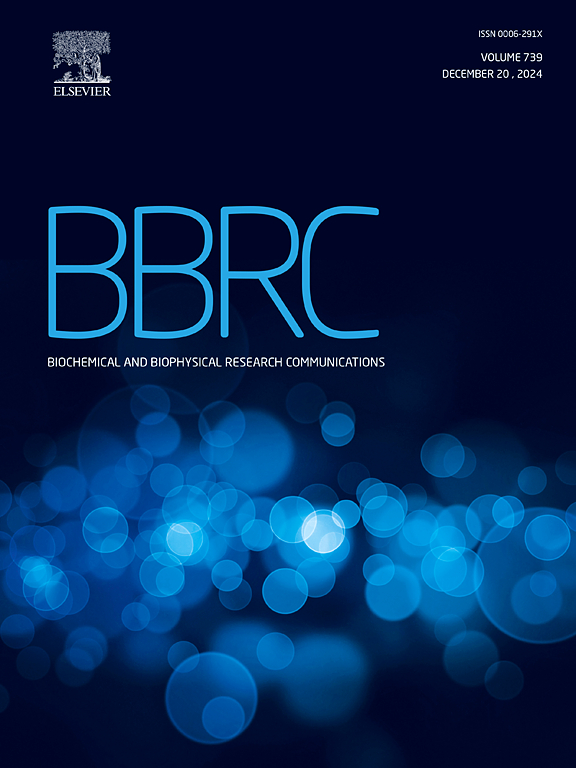双氢青蒿素通过TNF-α途径抑制血管生成,增强抗pd -1免疫治疗乳腺癌的疗效
IF 2.5
3区 生物学
Q3 BIOCHEMISTRY & MOLECULAR BIOLOGY
Biochemical and biophysical research communications
Pub Date : 2025-06-12
DOI:10.1016/j.bbrc.2025.152171
引用次数: 0
摘要
肿瘤血管异常促进免疫抑制微环境的形成,从而限制肿瘤免疫治疗的疗效,促进肿瘤的发展。双氢青蒿素(DHA)已显示出作为抗肿瘤药物的潜力。其抗血管生成作用的潜在作用尚未被发现。本研究探讨DHA是否抑制肿瘤诱导的血管生成,促进免疫治疗,并探讨其机制。4T-1细胞条件培养基(CM)对SVEC4-10活性和管形成的促进作用可被dha处理后的CM逆转。与此一致的是,在乳腺癌小鼠模型中给予DHA后,移植肿瘤血管的数量明显减少,血管周围细胞增加。随后,体内给药DHA可明显促进肿瘤中抗pd -1的抑制作用,逆转T细胞浸润和巨噬细胞表型。网络药理学和RNA-seq分析显示,DHA通过TNF-α途径抑制肿瘤血管生成。TNF-α细胞因子补充实验及相关信号通路关键分子的表达证实了上述机制。综上所述,DHA通过TNF-α途径缓解肿瘤细胞诱导的血管异常,参与肿瘤抗pd -1的作用。本文章由计算机程序翻译,如有差异,请以英文原文为准。
Dihydroartemisinin restrains angiogenesis through the TNF-α pathway to enhance the efficacy of anti-PD-1 immunotherapy in breast cancer
Tumor vascular abnormality promotes the formation of immunosuppressive microenvironment, thus limiting the efficacy of tumor immunotherapy and promoting tumor development. Dihydroartemisinin (DHA) has shown potential as an anti-tumor agent. The potential role of its anti-angiogenic effect has not yet been discovered. This research investigates whether DHA inhibits tumor-induced angiogenesis, promotes immunotherapy and explored the underlying mechanism. The promoting effect of 4T-1 cell-conditioned media (CM) on SVEC4-10 activity and tube formation can be reversed by DHA-treated with CM. Consistently, following DHA administration in a breast cancer mouse model, the number of transplanted tumor vessels was markedly reduced and perivascular cells increased. Subsequently, in vivo administration of DHA evidently promoted inhibitory effect of anti-PD-1 in tumor and reversed the infiltration of T cells and the phenotypes of macrophages. Network pharmacology and RNA-seq analysis revealed that DHA inhibit tumor growth by angiogenesis through the TNF-α pathway. Besides, TNF-α cytokine replenishment experiment and the expression of key molecules involved signaling pathway confirmed the above mechanism. In conclusion, DHA alleviates tumor cell-induced abnormal blood vessels through TNF-α pathway, which contributes to the anti-PD-1 efficacy of tumors.
求助全文
通过发布文献求助,成功后即可免费获取论文全文。
去求助
来源期刊
CiteScore
6.10
自引率
0.00%
发文量
1400
审稿时长
14 days
期刊介绍:
Biochemical and Biophysical Research Communications is the premier international journal devoted to the very rapid dissemination of timely and significant experimental results in diverse fields of biological research. The development of the "Breakthroughs and Views" section brings the minireview format to the journal, and issues often contain collections of special interest manuscripts. BBRC is published weekly (52 issues/year).Research Areas now include: Biochemistry; biophysics; cell biology; developmental biology; immunology
; molecular biology; neurobiology; plant biology and proteomics

 求助内容:
求助内容: 应助结果提醒方式:
应助结果提醒方式:


